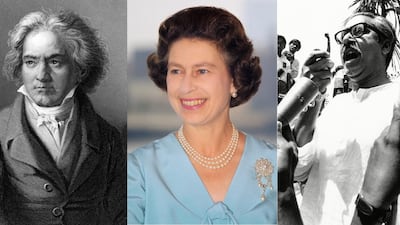A great composer died, a brilliant playwright was born and a filmmaker explored the ocean's depths – here are some of the most interesting things that happened on this day in history.
The world’s most influential composer died
Year: 1827
Across Germany in recent days, the sounds of Ludwig van Beethoven's Ode to Joy have been ringing out from balconies and windows amid the coronavirus quarantine. This comes just under 200 years after the German composer and pianist died.
Born in Bonn in December 1770 – this year is the 250th anniversary of his birth – Beethoven became one of the greatest European composers of all time, despite the fact that for a good portion of his career, he was going deaf.
Last month, a team of researchers from the Graduate School of Culture Technology at South Korean university Kaist actually proved, through a series of tests, that Beethoven is, in fact, history’s most influential classical music composer. He died aged 56 in Austria of cirrhosis of the liver.
The first royal email was sent
Year: 1976
Britain’s Queen Elizabeth II became the world’s first monarch to send an email – before the internet was even invented. It was 44 years ago today, and she was using a network called Arpanet, a precursor to the World Wide Web. She sent it from the Royal Signals and Radar Establishment in Malvern, a spa town in England, using her own email account, which had the username HME2 (Her Majesty, Elizabeth II).
The message itself was pretty dry, announcing the arrival of a new programming language that had been developed, but she signed off with a very informal “Elizabeth R”.
A filmmaker explored new depths of the ocean
Year: 2012
Many of us know and love filmmaker James Cameron for his big box office hits, such as Avatar (2009) and Titanic (1997), but did you know he's also a keen environmentalist and ocean explorer?
On this day in 2012, the Canadian became the first person to perform a solo descent to the bottom of the Mariana Trench, the deepest part of the Earth’s ocean, in the Deepsea Challenger submersible.
He's the first human to reach the 11-kilometre-deep undersea valley on his own, and had headed down there to collect scientific data and specimens. The descent took about 2 hours and 36 minutes, according to National Geographic.
Bangladesh declared independence
Year: 1971
On this day 49 years ago, Sheikh Mujibur Rahman signed a declaration making East Pakistan the sovereign and independent country of Bangladesh.
While this sparked the nine-month-long Bangladesh Liberation War, and East Pakistan officially became independent on December 16, March 26 is known as Bangladesh Independence Day.
Every year, the occasion is marked with parades, concerts, speeches and award ceremonies.
Government buildings in the capital of Dhaka, formerly known as Dacca, light up in red and green, two of the three colours that make up the national flag. These symbolise the country’s greenery and the sun rising.
Sheikh Mohammed bin Rashid celebrated his love of horses
Year: 2019
Last March, Sheikh Mohammed bin Rashid, Vice President and Ruler of Dubai, paid homage to his lifelong love of horses with a new book of poems that was launched at Meydan Racecourse on this day.

The 18-poem collection is called For the Love of Horses, and was released a few weeks after the leader's autobiography, My Story: 50 Stories in 50 Years, marking his half-century of service in the UAE government. In this, Sheikh Mohammed revealed that his love for horses dates back to an early age and, when was only 10 years old, he would help bring injured animals back to full health.
In 1996, Sheikh Mohammed founded the Dubai World Cup, today one of the richest horse racing meetings in the world.
A great American playwright is born
Year: 1911
A Streetcar Named Desire (1947), Cat on a Hot Tin Roof (1955) – these plays are the works of one man: Tennesse Williams. He was born Thomas Lanier Williams III in Columbus, Mississippi and worked on his skills as a playwright during the Depression while employed a St Louis shoe factory.
He worked various odd jobs while continuing to write until he got a break in 1944, when he penned The Glass Menagerie, a portrayal of a Southern American family living in a tenement.
Williams went on to win a Pulitzer Prize for A Streetcar Named Desire and enjoyed much success until later years, when a number of his plays were poorly reviewed.
In later life, he was frequently ill and struggled to recover after a severe mental and physical breakdown. He died aged 71 in New York.



